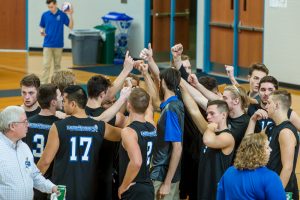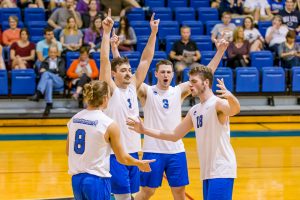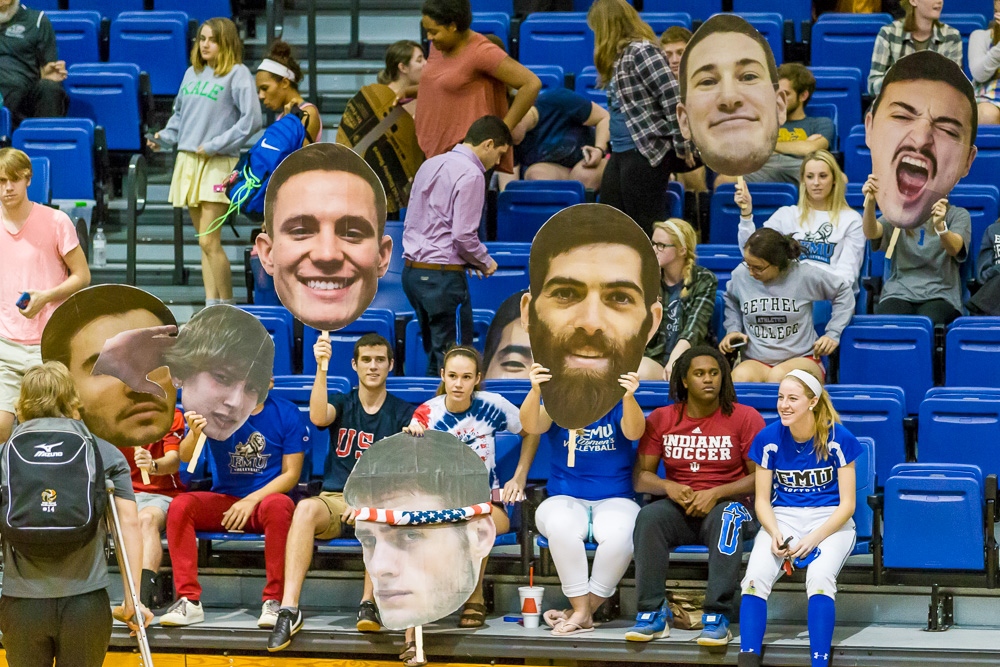With 19 wins this year and a championship within reach, Eastern Mennonite University’s men’s volleyball team is exhilarating fans — and the team can feel it.
“There’s been a lot more energy behind us this year,” said Travis Abele, a sophomore business administration major from Mechanicsville, Virginia. “Last year we were that bubble team: Were we in or were we out? It literally came down to a couple points. This year, we’re fighting for a one- or a two-seed for the big dance, so it’s been a complete 180 from an unknown to, ‘It’s in our hands.’”
The Royals played their last home stand to a large and enthusiastic crowd March 24, thumping Alvernia University 3-0, but then lost at Juniata College on Tuesday, which puts the now No. 11-AVCA-ranked Eastern Mennonite to 19-8 on the season, including 8-3 in the Continental Volleyball Conference (CVC). The team ends the regular season with four more straight road matches, starting today [March 31] at Cairn University.
The team aims to secure the program’s first-ever bid into the four-team CVC Tournament. But they’ve already made history, having equaled the 2002 and 2006 teams for the second-most wins in program history. The 2007 squad finished 22-11 and is the only EMU team to earn more than 20 wins.
Culture change and communication
The Royals’ ongoing success hasn’t just happened; it’s built on what sole senior Scott Brigham, a business major from Richmond, sums up in one word: “Chemistry.”

It’s cultural, players say: In addition to having high expectations, they know what it takes to work together — and win — as a team. That’s because six members are from the Richmond area, where they played together on teams or at least in pickup games; two others also have backgrounds in a common club.
Interim head coach Ross Madden said that knowing each others’ individual strengths and vulnerabilities makes for a tight team. “They have to know exactly how their teammates will react to the play, within half a second,” he said.
It also takes direct, verbal communication. Junior Micah Buller, a biochemistry major from Richmond, remembers a players’ meeting near the end of last year’s season that put things into perspective for the team: every last member needed to be all-in. That meeting strengthened the team for the remainder of that season, he thinks, and the spirit has carried over into this year.
Brigham calls it “not beating around the bush.” He said that if something’s not working, the team comes together to improve.
“No one’s afraid to step up and say, ‘We’ve got to change something now.’ And usually everyone gets on board, everyone hears each other out, and usually decisions are made within about five minutes,” said sophomore Travis Abele, of Mechanicsville.

“We’re on mission,” said Madden. “When guys want the same things, that’s what brings them together. That’s really what has helped us this year come together as a team. We want to win.”
Accountability matters
But there’s more to the story, too, which Madden is quick to point out: “A lot of them are best friends. A lot of them are living together. They eat meals together. They take classes together. They’re each other’s best friends. It’s pretty awesome.”
That’s not just the coach’s perspective. Buller calls the group “close-knit.”
Abele goes even further: “You start to lose the word ‘team’ and start migrating to ‘family,’” he said. “We’re not afraid to be big brothers for everyone else. But it happens both ways. We each have that big brother mentality.”

This has meant sitting down with teammates who are struggling, and not just on the court. When one teammate started missing classes, “we literally all ganged up on him one day in a nice way and were like, ‘It’s got to stop,’” said Abele. “I don’t think he’s missed a class since. That’s the kind of accountability we have.”
When the team comes together around a “slipping” teammate, “it’s not him punishing him per se, but like us coming together and saying, ‘Come on, we got you,’” said Brigham.
“Because in the long run, it could affect all of us,” said Buller. “School’s always first, and if that slips, then the team starts to slip. If they’re not there, then it hurts the team.”
Ultimately, Brigham says, the experience is teaching teammates about how to work together, how to analyze a situation, and decide when and if it’s necessary to step into a mediation or leadership role.
That’s a different approach from just blind pursuit of glory; it’s unselfish volleyball. To Madden, that separates the “greats” from the “goods.”
“Players that really want to celebrate another teammate’s success are hard to come by,” he said. “Great teammates take pride in each other, even if it means you won’t get the ball.”
That kind of teamwork, for these particular athletes, has made all the difference — on and off the court.
